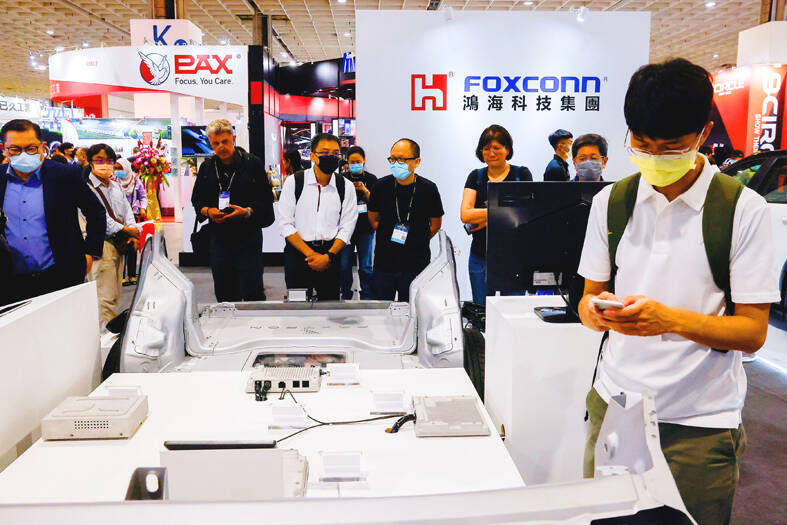Taiwan-based manufacturing giant Hon Hai Precision Industry Co (鴻海精密), also known as Foxconn Technology Group (富士康科技集團), has invested in Japanese robotics start-up Telexistence Inc (TX) by participating in its latest round of fundraising, with plans to work with it to jointly produce the next-generation robot model: “Ghost.”
Telexistence said in a statement yesterday that it completed its Series B round of fundraising, securing US$170 million.
In addition to the lead investors in previous funding rounds, such as Monoful Venture Partners, KDDI Open Innovation Fund and Airbus Ventures, Telexitence said it has also secured financial support from HH-CTBC Partnership, Softbank Group (SBG) and Globis Capital Partners.

Photo: Ann wang, Reuters
HH-CTBC Partnership is also known as Foxconn Co-GP Fund, which was set up by Hon Hai and Taiwan’s CTBC Financial Holding Co (中信金控).
However, Telexistence, a developer of remote-controlled robotics, did not disclose other financial details about the latest funding round.
After obtaining funds from Hon Hai, Telexistence would initiate its collaboration with Hon Hai to establish a production technology to carry out commercial production for its next-generation robotics model, “Ghost,” the company said.
In addition, Telexistence entered into a strategic business partnership agreement with Softbank Robotic Group Corp, a subsidiary of Softbank Group, to promote their business collaboration globally, with a focus on accelerating commercialization in North America, it said.
“With the proud backing of our new partners SBG and Foxconn, TX increases its commitment to accelerate the rapid expansion of its existing robot operations and drive the development of robots with human-level versatility, which is the goal of anyone involved in robotics,” Telexistence CEO Jin Tomioka said in the statement.
“With this latest funding, we aim to amplify our search for top, diverse talent to enhance our global capabilities at scale,” Tomioka said.
Telexistence, which was established in 2017, in 2021 announced a partnership with FamilyMart, one of the three largest convenience store chains in Japan, where it deployed robots to 300 FamilyMart stores across the country.

MULTIFACETED: A task force has analyzed possible scenarios and created responses to assist domestic industries in dealing with US tariffs, the economics minister said The Executive Yuan is tomorrow to announce countermeasures to US President Donald Trump’s planned reciprocal tariffs, although the details of the plan would not be made public until Monday next week, Minister of Economic Affairs J.W. Kuo (郭智輝) said yesterday. The Cabinet established an economic and trade task force in November last year to deal with US trade and tariff related issues, Kuo told reporters outside the legislature in Taipei. The task force has been analyzing and evaluating all kinds of scenarios to identify suitable responses and determine how best to assist domestic industries in managing the effects of Trump’s tariffs, he

TIGHT-LIPPED: UMC said it had no merger plans at the moment, after Nikkei Asia reported that the firm and GlobalFoundries were considering restarting merger talks United Microelectronics Corp (UMC, 聯電), the world’s No. 4 contract chipmaker, yesterday launched a new US$5 billion 12-inch chip factory in Singapore as part of its latest effort to diversify its manufacturing footprint amid growing geopolitical risks. The new factory, adjacent to UMC’s existing Singapore fab in the Pasir Res Wafer Fab Park, is scheduled to enter volume production next year, utilizing mature 22-nanometer and 28-nanometer process technologies, UMC said in a statement. The company plans to invest US$5 billion during the first phase of the new fab, which would have an installed capacity of 30,000 12-inch wafers per month, it said. The

Taiwan’s official purchasing managers’ index (PMI) last month rose 0.2 percentage points to 54.2, in a second consecutive month of expansion, thanks to front-loading demand intended to avoid potential US tariff hikes, the Chung-Hua Institution for Economic Research (CIER, 中華經濟研究院) said yesterday. While short-term demand appeared robust, uncertainties rose due to US President Donald Trump’s unpredictable trade policy, CIER president Lien Hsien-ming (連賢明) told a news conference in Taipei. Taiwan’s economy this year would be characterized by high-level fluctuations and the volatility would be wilder than most expect, Lien said Demand for electronics, particularly semiconductors, continues to benefit from US technology giants’ effort

In a small town in Paraguay, a showdown is brewing between traditional producers of yerba mate, a bitter herbal tea popular across South America, and miners of a shinier treasure: gold. A rush for the precious metal is pitting mate growers and indigenous groups against the expanding operations of small-scale miners who, until recently, were their neighbors, not nemeses. “They [the miners] have destroyed everything... The canals, springs, swamps,” said Vidal Britez, president of the Yerba Mate Producers’ Association of the town of Paso Yobai, about 210km east of capital Asuncion. “You can see the pollution from the dead fish.